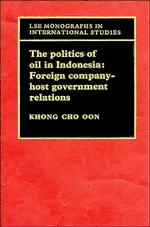Book contents
- Frontmatter
- Contents
- List of figures
- Acknowledgments
- 1 THE IMPACT OF THE FOREIGN COMPANY ON GOVERNMENT POLICIES IN LESS-DEVELOPED COUNTRIES
- 2 THE INDONESIAN PETROLEUM INDUSTRY: FORM AND CONTENT OF AGREEMENTS
- 3 FINANCIAL PROVISIONS AND CONSEQUENT AREAS OF DISPUTE
- 4 PROVISIONS FOR DEVELOPMENT AND NATIONAL CONTROL
- 5 PROBLEMS OF NEGOTIATION AND CONTRACTUAL CHANGE
- 6 ORGANISATIONAL STRUCTURE AND THE NEGOTIATING PROCESS
- 7 SOME REGIONAL CONSIDERATIONS FOR SOUTHEAST-ASIAN OIL-PRODUCER GOVERNMENTS
- 8 THE VIABILITY OF TRANSNATIONAL MINERAL AGREEMENTS
- Notes
- Select bibliography
- Index
6 - ORGANISATIONAL STRUCTURE AND THE NEGOTIATING PROCESS
Published online by Cambridge University Press: 05 November 2011
- Frontmatter
- Contents
- List of figures
- Acknowledgments
- 1 THE IMPACT OF THE FOREIGN COMPANY ON GOVERNMENT POLICIES IN LESS-DEVELOPED COUNTRIES
- 2 THE INDONESIAN PETROLEUM INDUSTRY: FORM AND CONTENT OF AGREEMENTS
- 3 FINANCIAL PROVISIONS AND CONSEQUENT AREAS OF DISPUTE
- 4 PROVISIONS FOR DEVELOPMENT AND NATIONAL CONTROL
- 5 PROBLEMS OF NEGOTIATION AND CONTRACTUAL CHANGE
- 6 ORGANISATIONAL STRUCTURE AND THE NEGOTIATING PROCESS
- 7 SOME REGIONAL CONSIDERATIONS FOR SOUTHEAST-ASIAN OIL-PRODUCER GOVERNMENTS
- 8 THE VIABILITY OF TRANSNATIONAL MINERAL AGREEMENTS
- Notes
- Select bibliography
- Index
Summary
THE STRUCTURE OF THE INDUSTRY
The governmental organisation and domestic structure set limits to the types of contract which a host government may set out to secure. The host government has to know what arrangements are possible to achieve and would be practicable in effect when bargaining with foreign companies. The governmental configuration, so far as it affects foreign oil companies, is therefore examined here. But in the Indonesian case, a further consideration comes into the picture. For in dealing with the oil companies, the government came to find that its principal weakness has been its ineffective authority, which derived from the autonomous status of the governmental body charged with responsibility for petroleum concerns. The problem of the state oil company's accountability to the central government therefore requires special attention, an issue of especial relevance to host governments which delegate responsibility for mineral affairs to organs not under direct government control. Finally, given such confines, any settlement which may be arrived at will also reflect the ability of the government side to negotiate effectively and to employ to maximum advantage those resources available to it. So beyond the government's formal configuration, its approaches to negotiation will have to be dealt with for a complete understanding of the host government's situation.
It is often the case for host governments that the skilled personnel and technical and financial resources necessary to effectively negotiate and administer contracts are not available in sufficient number.
- Type
- Chapter
- Information
- The Politics of Oil in IndonesiaForeign Company-Host Government Relations, pp. 159 - 186Publisher: Cambridge University PressPrint publication year: 1986



